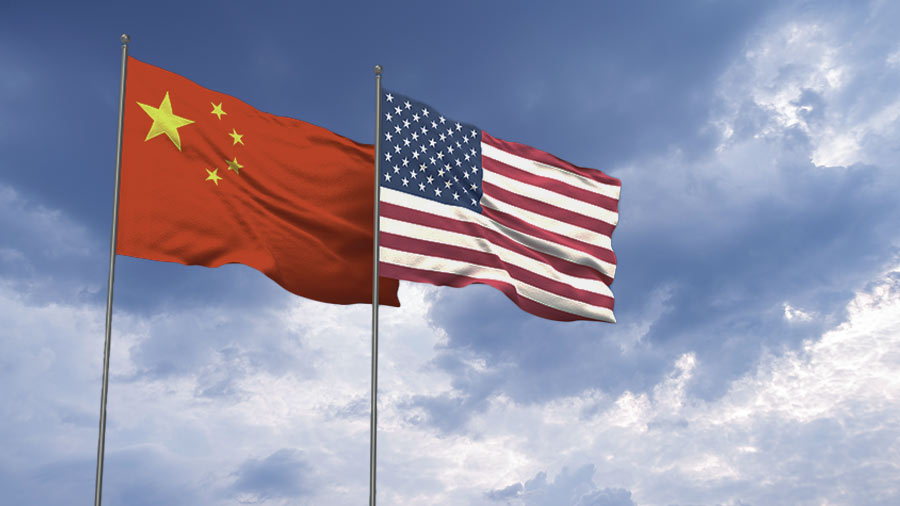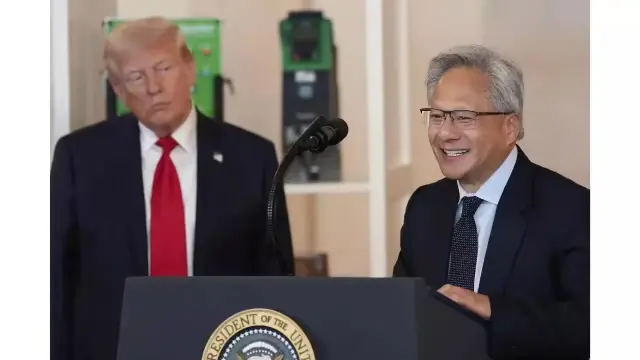trending
neon
Cirque du Soleil offers summer ticket deals
dining out
Celebs ditch the Strip for iconic Henderson restaurant
july 
trending
neon
Cirque du Soleil offers summer ticket deals
dining out
Celebs ditch the Strip for iconic Henderson restaurant
july 

The US investment ban on China is now in effect, marking a significant shift in economic relations between the two nations. Here's what it means for investors and businesses




The United States’ investment ban on China has officially come into effect, marking a significant shift in the economic relationship between the two countries. The move, which restricts American investors from funding certain Chinese companies, especially those involved in sectors like technology and defense, has profound implications for both global financial markets and U.S.-China relations. But what does this mean for businesses, investors, and the broader geopolitical landscape?
The investment ban was first proposed in response to growing concerns over national security, intellectual property theft, and the technological and military advancements being made by China. The U.S. government expressed fears that American investments in Chinese companies, particularly in high-tech industries such as artificial intelligence, telecommunications, and semiconductors, could indirectly fund China’s military capabilities and surveillance infrastructure.
In addition to national security concerns, the U.S. has also raised alarm over human rights abuses, particularly in regions like Xinjiang, where allegations of forced labor and surveillance of ethnic minorities have intensified. With these concerns in mind, the U.S. administration, led by President Biden, decided to enforce a ban that prohibits U.S. investors from purchasing securities tied to specific Chinese firms with links to these controversial areas.
The move is part of a broader strategy aimed at countering China’s growing global influence and technological advancements. By restricting investment in China, the U.S. hopes to curb the flow of capital into industries that could potentially be used to enhance China’s economic and military power.
For U.S. investors, the immediate effect of the investment ban is the forced divestment from certain Chinese stocks and the cessation of new investments in specific Chinese companies. This includes companies listed on major stock exchanges such as the New York Stock Exchange and NASDAQ, but also extends to private equity and venture capital investments in Chinese firms.
Institutional investors, such as pension funds, mutual funds, and exchange-traded funds (ETFs), have had to adjust their portfolios, either by liquidating Chinese holdings or restructuring their investment strategies to exclude these companies. The ban also affects individual investors who previously bought shares in Chinese firms through U.S. financial markets.
The impact has been felt across various sectors, with high-profile Chinese technology companies like Alibaba, Tencent, and Huawei being caught up in the restrictions. These firms, which had been the recipients of significant American capital in the past, are now facing challenges in attracting further investment from U.S.-based sources.
While the immediate impact on U.S. investors is clear, the investment ban is also expected to have broader economic consequences, both in the U.S. and in China.
For the U.S., the ban may lead to reduced access to Chinese market opportunities. China remains one of the largest economies in the world, and many U.S. companies rely on Chinese consumers for revenue, particularly in sectors like technology, automotive, and consumer goods. Companies that have significant exposure to the Chinese market may face more difficulty in doing business, and may need to rethink their strategies to navigate this new economic reality.
Additionally, the ban could lead to a reduction in the number of Chinese firms seeking U.S. listings, potentially diminishing the attractiveness of U.S. stock markets to foreign companies. Historically, U.S. financial markets have been a key destination for global companies seeking access to capital. However, as Chinese companies face increased scrutiny and potential exclusion from U.S. exchanges, this could shift the dynamic and encourage them to seek funding through other channels, such as Hong Kong or European markets.
For China, the ban represents a significant challenge. Chinese companies that are reliant on foreign investment, particularly from the U.S., will likely feel the effects of reduced access to capital. The Chinese government has already expressed concerns over the long-term effects of these restrictions, which could hamper the ability of Chinese firms to expand globally and compete with their international counterparts. In response, China may increase efforts to attract investments from non-U.S. sources, such as European or Middle Eastern investors, or even create alternative financing mechanisms that bypass U.S. influence.
The ban could also accelerate China’s drive for technological self-sufficiency. As the U.S. tightens its grip on investments in Chinese firms, China is likely to increase its focus on developing domestic alternatives in areas like semiconductor manufacturing, artificial intelligence, and other emerging technologies. This shift could make China even more competitive in the global tech landscape, but may also create friction as both countries seek to dominate critical technologies.
The U.S. investment ban on China is also expected to have far-reaching geopolitical and diplomatic implications. The move is another escalation in the ongoing U.S.-China trade war, which has already seen tariffs, export restrictions, and diplomatic tensions rise in recent years. The ban signals the growing divide between the two countries, not just in terms of trade, but in their broader ideological and strategic competition.
The ban has already been met with strong condemnation from China, which views the move as an unfair attempt to stifle its economic growth and limit its global influence. Chinese officials have warned that the U.S. risks isolating itself from the global economy and alienating potential allies if it continues to impose these types of restrictions. As China expands its own global economic initiatives, such as the Belt and Road Initiative, it may seek to build deeper economic ties with countries that are less reliant on U.S. investment, potentially creating alternative trade and investment networks.
In turn, the U.S. could face increasing diplomatic pressure from its allies, particularly those in Europe and Asia, who may have concerns about the broader ramifications of the investment ban. While many countries share the U.S. concerns over China’s growing influence, they may not be fully aligned with its aggressive stance. Countries that have significant economic ties with China, such as Germany, Japan, and South Korea, may find themselves caught in the middle of this dispute, potentially facing tough choices about how to balance their economic interests with their political alliances.
As the investment ban takes effect, there are several potential pathways for its future development. One possibility is that the U.S. may expand the scope of the ban to include additional Chinese companies or industries, particularly those that are perceived as being involved in sensitive sectors like cybersecurity, biotechnology, or advanced manufacturing. There is also the possibility that the Biden administration may introduce further sanctions or trade restrictions targeting specific Chinese industries or government entities.
Alternatively, there could be efforts to de-escalate tensions, particularly if both countries recognize the mutual economic benefits of collaboration in certain areas. In this scenario, diplomatic talks could lead to adjustments in the investment ban, or even its eventual reversal, depending on shifts in U.S.-China relations and broader global dynamics.
For now, the U.S. investment ban on China remains in effect, and its impact is likely to be felt for years to come. The move represents a critical juncture in the ongoing U.S.-China rivalry, reshaping the future of global trade, finance, and technology. As both countries adjust to this new reality, the world will be watching closely to see how this conflict unfolds and how it will shape the future of international investment and economic power
The US investment ban on China is now in effect, marking a significant shift in economic relations between the two nations. Here's what it means for investors and businesses
the latest

Cerebras to Deploy AI Infrastructure at UAE Stargate Campus
Cerebras Systems, a leading AI hardware company, announced plans to deploy its advanced AI infrastructure at the UAE’s Stargate data campus.

US Approves Nvidia AI Chip Sales to UAE Amid Export Curbs
The U.S. government has authorized certain Nvidia AI chip exports to the United Arab Emirates, easing restrictions imposed under Washington’s export control policies. The decision signals a balancing act between U.S. security concerns and the UAE’s growing role in global AI development.

US Approves Billions in Nvidia AI Chip Sales to UAE
The U.S. Commerce Department has granted export licenses for several billion dollars’ worth of Nvidia AI chips to the UAE under a bilateral AI agreement, Bloomberg reports.

Nvidia CEO Frustrated as U.S. Delays UAE AI Chip Deal
Nvidia CEO Jensen Huang has voiced frustration over delays in the UAE’s AI chip deal, reportedly caused by U.S. pressure. The delay risks slowing regional AI expansion and complicating U.S.-UAE tech diplomacy.

Trump’s UAE Chip Deal Delays Frustrate Nvidia’s Jensen Huang
Nvidia CEO Jensen Huang expressed frustration over delays in the Trump-backed UAE chip deal, raising concerns over AI and semiconductor expansion.

UAE President, OpenAI CEO Discuss AI Collaboration Plans
UAE President Sheikh Mohamed bin Zayed met OpenAI CEO Sam Altman to explore collaboration in AI, aiming to boost innovation and digital transformation.

Nvidia CEO Frustrated by Delays in Trump’s UAE Chips Deal
Delays in Donald Trump’s UAE chip deal have left Nvidia CEO Jensen Huang frustrated, raising concerns about global chip supply chains and AI ambitions.

Ericsson, Nokia Secure $2.7B VodafoneThree UK Deal
VodafoneThree has awarded Ericsson and Nokia a $2.7 billion contract to build the UK’s largest 5G network, a move set to reshape telecom competition.

UAE President Meets OpenAI CEO to Strengthen AI Ties
UAE President Sheikh Mohammed bin Zayed met OpenAI CEO Sam Altman in Abu Dhabi to explore deeper AI collaboration, focusing on research, infrastructure, and innovation.